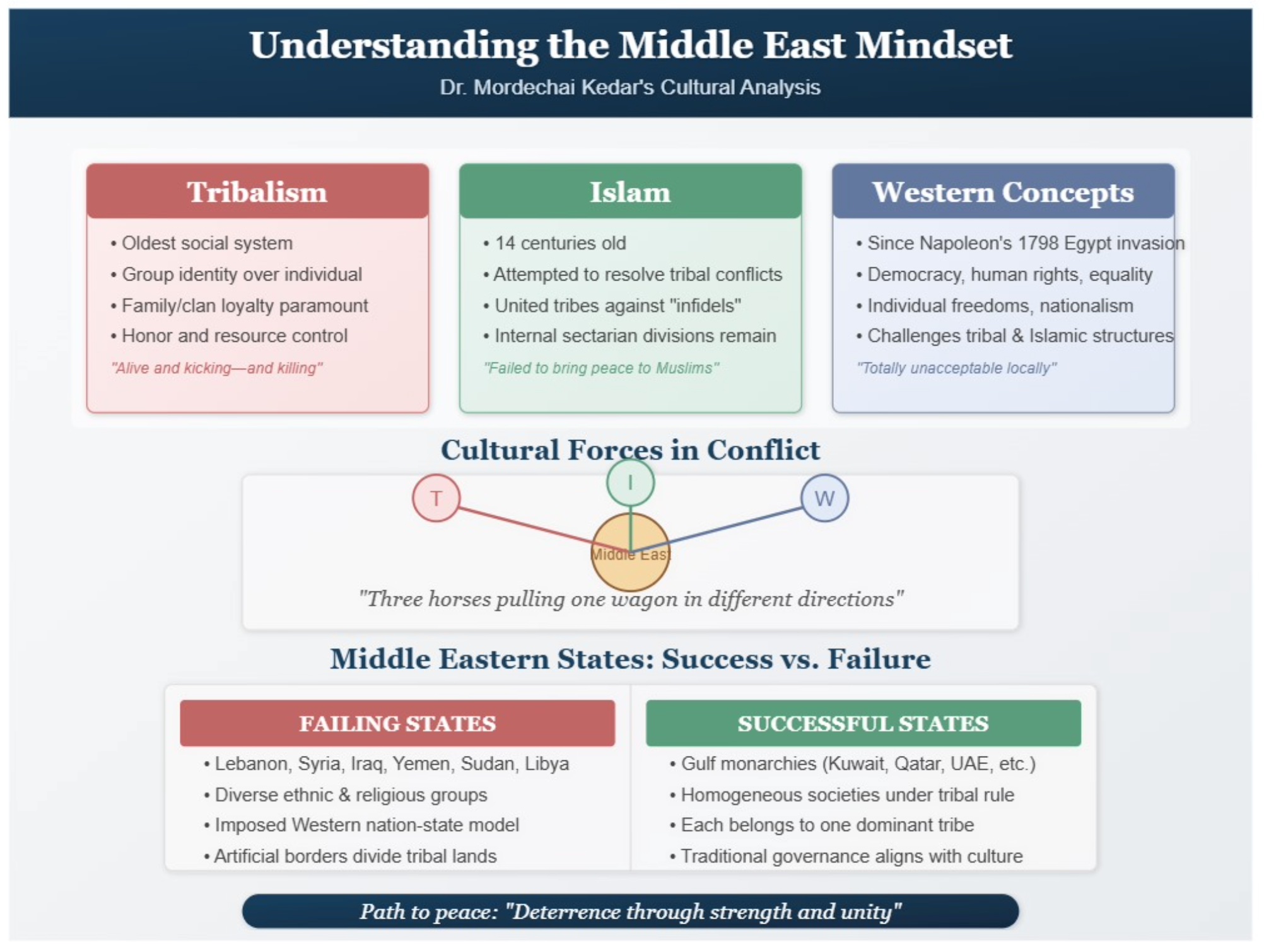Interview review: Dr. Mordechai Kedar- The path to deterrence

In a recent and compelling episode of The Real Israel Podcast with Chaim Malespin engages with Dr. Mordechai Kedar, a seasoned scholar of Arab studies and retired Israeli intelligence officer, to dissect the complexities of Middle Eastern geopolitics, Israel’s existential struggles, and the cultural undercurrents shaping the region. The interview, dense with historical insights and provocative analysis, offers a stark examination of why Israel remains a flashpoint in global discourse and how its adversaries weaponize theology, tribalism, and ideology against its existence.
Cultural Toolboxes: Tribalism, Islam, and Modernism
Dr. Kedar begins by framing Middle Eastern societies through the lens of three competing “cultural toolboxes”: tribalism, Islam, and modernism. He argues that tribalism, rooted in desert survival strategies, prioritizes clan loyalty over individualism. This framework, he explains, perpetuates practices like honor killings, blood feuds, and intra-clan marriages, which persist despite Islam’s attempts to reform such traditions.
Islam, introduced 1,400 years ago, sought to mitigate tribal violence by imposing religious unity. However, Dr. Kedar contends that Islam’s failure to eradicate tribalism is evident in ongoing sectarian conflicts (e.g., Sunni vs. Shia in Iraq) and the resurgence of jihadist ideologies. Jihad, he posits, redirects tribal aggression outward against “infidels,” uniting Muslims under a shared religious banner. Yet, this unity remains fragile, as seen in intra-Muslim wars and the rise of groups like ISIS.
The third toolbox—modernism—clashes with both tribalism and Islam. Western concepts like liberalism, gender equality, and democracy face fierce resistance in societies where collective identity and religious orthodoxy dominate. Dr. Kedar highlights how modernism’s emphasis on individualism and secular governance destabilizes nations like Syria and Iraq, which are artificial constructs of colonial borders. In contrast, homogeneous Gulf states (e.g., UAE, Qatar) thrive by aligning governance with tribal cohesion, not Western models.
Iran’s Theological War Against Israel
A significant portion of the interview focuses on Iran’s ideological crusade against Israel. Dr. Kedar asserts that Iran views Israel not merely as a territorial adversary but as a theological threat to Islam. According to Islamic doctrine, Judaism—as a “canceled” religion—has no right to sovereignty. Israel’s existence challenges the Islamic narrative that Allah’s final revelation (Islam) supersedes earlier Abrahamic faiths.
Iran exploits this theological tension by uniting disparate groups (Hamas, Hezbollah, Houthis) under anti-Israel rhetoric. Dr. Kedar warns that Iran’s strategy hinges on uniting Sunni and Shia factions through shared hatred of Israel, despite their historical divisions. He critiques the West for underestimating how deeply Islamic theology fuels this conflict, noting that even “moderate” Muslims may radicalize when confronted with Israel’s perceived defiance of divine order.
The interview also debunks claims that Jerusalem holds intrinsic Islamic significance. Dr. Kedar points out that Jerusalem is absent from the Quran; its prominence stems from 7th-century political rivalries between the Umayyads and Hashemites. The Al-Aqsa Mosque’s association with Jerusalem, he argues, was a fabricated narrative to legitimize Umayyad rule, illustrating how historical revisionism fuels modern territorial disputes.
Gaza, Deterrence, and the Illusion of Peace
Addressing the October 7 Hamas attacks, Dr. Kedar acknowledges Israel’s intelligence failures but emphasizes the broader lesson: appeasement strategies (e.g., economic incentives for Gaza) cannot coexist with jihadist ideologies. He rejects the notion of a negotiated peace, arguing that Middle Eastern cultures only respect strength. Drawing parallels to tribal hudna (temporary truces), he insists that lasting security for Israel depends on deterrence—military dominance so overwhelming that adversaries dare not provoke conflict.
Regarding Gaza’s future, Dr. Kedar is skeptical of reconstruction plans tied to international aid or Palestinian governance. He advocates for depopulating Gaza through voluntary emigration, drawing parallels to Syrian refugees fleeing civil war. Alternatively, he suggests transforming Gaza into a commercial hub under international oversight, leveraging its coastline for trade between Asia and Europe. Such a vision, however, hinges on dismantling Hamas’s ideological and infrastructural grip—a task he admits is fraught with complexity.
The Gulf Exception: Pragmatism Over Theology
A glimmer of hope emerges in Dr. Kedar’s analysis of Gulf states like the UAE. Unlike Iran or Hamas, these nations prioritize pragmatic coexistence over theological dogma. By deferring Israel’s fate to “Allah’s will,” Gulf leaders sidestep ideological warfare, focusing instead on economic and technological collaboration. This approach, he argues, offers a template for regional stability—if replicated elsewhere.

Recommendations for Truth-Seekers
Dr. Kedar concludes with advice for audiences navigating misinformation:
Learn Arabic and study primary sources to counter propaganda.
Understand Islamic theology, particularly verses weaponized against Israel.
Read historians like Bernard Lewis to grasp the Middle East’s colonial and cultural fractures.
Promote deterrence as Israel’s only viable strategy against existential threats.
Critical Reflections
While Dr. Kedar’s expertise is undeniable, his views occasionally veer into deterministic cultural essentialism. By framing Middle Eastern conflicts as immutable products of tribalism and Islam, he risks oversimplifying socio-political dynamics. For instance, his dismissal of democracy’s potential overlooks grassroots movements in Tunisia or Jordan that seek pluralism within Islamic frameworks. Additionally, his advocacy for mass Gazan emigration raises ethical questions about displacement and human rights.
Nevertheless, the interview’s value lies in its unflinching examination of Israel’s security paradigm. Dr. Kedar’s warnings about theological warfare and deterrence resonate amid rising global antisemitism and Iran’s nuclear ambitions. For policymakers and observers alike, his insights underscore the urgent need for strategies that blend military resolve with nuanced cultural understanding.
Final Takeaway
Dr. Mordechai Kedar’s interview is a masterclass in connecting historical dots to illuminate present-day crises. While his perspectives may polarize, they compel listeners to confront uncomfortable truths about the Middle East’s entrenched divisions and Israel’s precarious position. In a region where myths often outweigh facts, Kedar’s call for clarity—through education, deterrence, and pragmatic alliances—offers a roadmap for survival in an era of perpetual conflict.

Aurthur is a technical journalist, SEO content writer, marketing strategist and freelance web developer. He holds a MBA from the University of Management and Technology in Arlington, VA.












